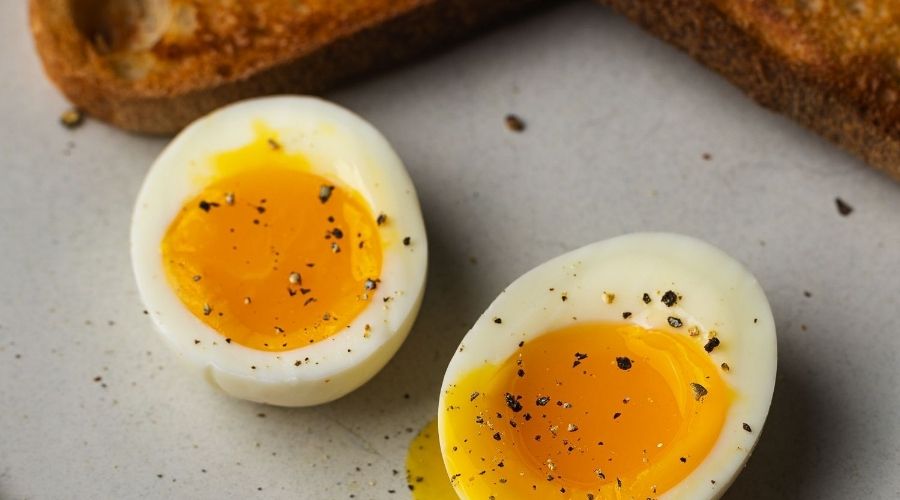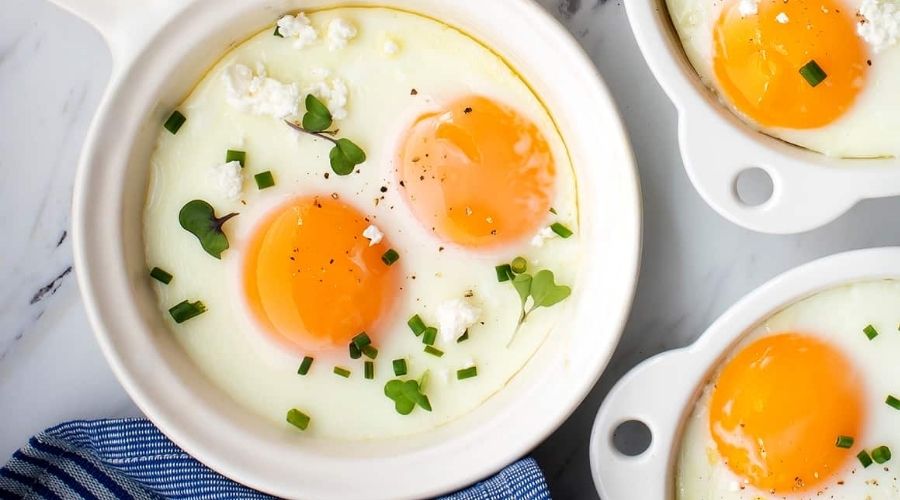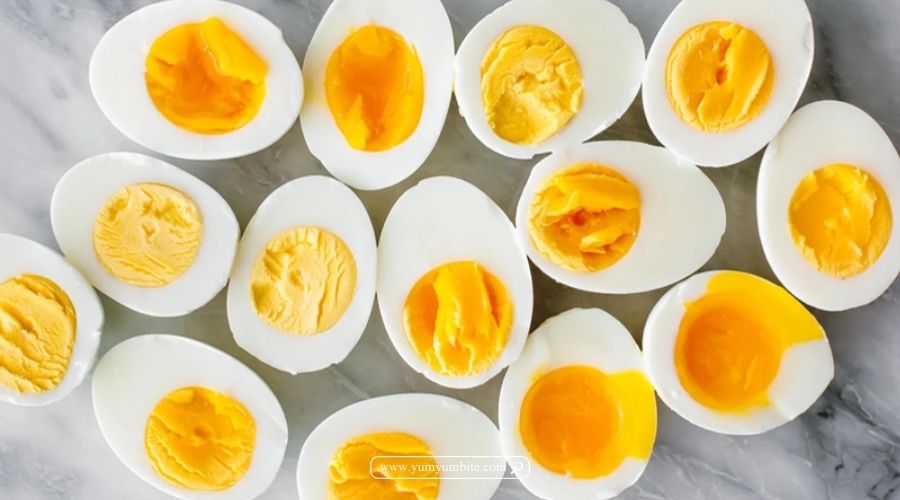Storing cooked eggs properly is essential for maintaining their freshness, flavor, and safety.
Whether you’ve prepared a batch of hard-boiled eggs for a quick snack or made a delicious egg salad for lunch, understanding the best storage practices can help you enjoy these protein-packed foods for longer.
In this guide, we’ll explore effective methods for storing cooked eggs, including refrigeration and freezing techniques, as well as tips on how to tell if they’ve gone bad.
By following these guidelines, you can reduce food waste and ensure that your cooked eggs remain a delicious and nutritious addition to your meals.
Why Storing Cooked Eggs Properly Matters
Storing cooked eggs properly is essential for both food safety and maintaining their quality.
Cooked eggs can be a versatile addition to a variety of meals, from salads to sandwiches, but improper storage can lead to spoilage and potential foodborne illnesses.
Eggs, even when cooked, can harbor bacteria that thrive in warm environments, making it crucial to refrigerate them promptly.
Proper storage techniques help prevent the growth of harmful pathogens while preserving the texture and flavor of the eggs.
Additionally, well-stored cooked eggs can retain their nutritional benefits, ensuring that you get the most out of this protein-packed food.
By understanding the importance of proper storage, you can enjoy the convenience and health benefits of cooked eggs safely and deliciously.
How to Store Cooked Eggs: A Complete Guide

Storing cooked eggs correctly is vital for ensuring their safety, freshness, and flavor.
Whether you have hard-boiled eggs or scrambled eggs left over, following these guidelines will help you maximize their shelf life and maintain their quality.
1. Cool Down Quickly
After cooking eggs, allow them to cool to room temperature as quickly as possible.
For hard-boiled eggs, this can be accelerated by placing them in a bowl of ice water. Rapid cooling helps prevent bacteria from multiplying.
2. Refrigerate Promptly
Once the eggs have cooled, place them in the refrigerator. Cooked eggs should be stored at a temperature below 40°F (4°C) to minimize the risk of bacterial growth.
It’s best to refrigerate them within two hours of cooking.
3. Use Airtight Containers
Store cooked eggs in airtight containers to keep them fresh and prevent them from absorbing odors from other foods in the refrigerator.
Glass containers or BPA-free plastic containers work well for this purpose.
4. Label and Date
Always label your storage containers with the date you cooked the eggs.
This practice helps you keep track of their freshness and ensures that you consume them within a safe time frame.
5. Storage Duration
Cooked eggs can typically be stored in the refrigerator for up to one week.
If you’re unsure, check for any signs of spoilage before consuming them.
6. Freezing Cooked Eggs
If you want to store cooked eggs for a longer period, you can freeze them. Scrambled eggs freeze well, while hard-boiled eggs can be peeled and frozen as well.
To freeze, place them in an airtight container or freezer-safe bag, removing as much air as possible. Cooked eggs can be stored in the freezer for up to six months.
7. Thawing and Reheating
When you’re ready to use frozen cooked eggs, thaw them in the refrigerator overnight.
Reheat scrambled eggs in a microwave or on the stovetop, ensuring they reach an internal temperature of 165°F (74°C).
Hard-boiled eggs can be eaten cold or reheated gently in warm water.
8. Inspect Before Eating
Before consuming stored cooked eggs, always inspect them for any signs of spoilage, such as an off smell or unusual texture.
If you have any doubts about their freshness, it’s safer to discard them.
By following these guidelines on how to store cooked eggs, you can ensure their safety, preserve their quality, and enjoy their nutritional benefits for days to come!
What to Look for While Storing Cooked Eggs

When storing cooked eggs, several key factors can help ensure their safety and quality. Here’s what to look for:
1. Cooling Time
After cooking, it’s essential to cool eggs quickly. Look for signs that the eggs have reached room temperature within two hours to minimize the risk of bacterial growth.
2. Refrigeration Conditions
Ensure your refrigerator is set to a temperature below 40°F (4°C). This is crucial for preventing spoilage and keeping cooked eggs fresh.
3. Storage Containers
Use airtight containers to store cooked eggs. Check that the containers are clean and free of any odors. Glass or BPA-free plastic containers are ideal choices for maintaining freshness.
4. Labeling
Always label your containers with the date of cooking. This will help you keep track of how long the eggs have been stored and ensure you consume them within the recommended timeframe.
5. Visual Inspection
Before consuming, inspect the eggs for any signs of spoilage, such as discoloration, an off smell, or unusual textures.
Fresh cooked eggs should have a consistent appearance and pleasant aroma.
6. Storage Duration
Keep track of how long the cooked eggs have been stored. They should be eaten within one week when refrigerated.
If freezing, ensure they are properly packed and labeled with the date.
7. Handling Precautions
Be mindful of how you handle the eggs during storage.
Use clean utensils and avoid touching the cooked eggs with bare hands to minimize contamination.
By paying attention to these factors, you can effectively store cooked eggs, ensuring they remain safe, fresh, and delicious for your enjoyment!
How to Choose the Right Accessories for Storing Cooked Eggs

Selecting the appropriate accessories for storing cooked eggs is essential for maintaining their freshness and safety.
Here’s how to make the right choices:
1. Airtight Containers
Opt for high-quality airtight containers made from glass or BPA-free plastic. These containers help prevent air exposure, which can lead to spoilage.
Glass containers are particularly beneficial as they do not retain odors and are microwave-safe for reheating.
2. Egg Trays or Cartons
If you have a significant number of hard-boiled eggs, consider using an egg tray or the original carton.
These options help keep the eggs organized and protected from damage. Make sure the carton is clean and dry before use.
3. Freezer Bags
For longer storage, use heavy-duty freezer bags. These bags are designed to withstand low temperatures and can help prevent freezer burn.
Be sure to remove as much air as possible before sealing.
4. Vacuum Sealers
Investing in a vacuum sealer can be an excellent option if you plan to store cooked eggs for an extended period.
Vacuum sealing removes air from storage bags, significantly extending shelf life and preventing spoilage.
5. Microwave-Safe Accessories
If you intend to reheat your cooked eggs, ensure that your storage containers are microwave-safe.
This allows for convenient reheating without damaging the container or compromising the eggs’ quality.
6. Cooling Racks
Before transferring cooked eggs to storage, use a cooling rack to allow them to cool quickly and evenly.
This helps to prevent condensation from forming inside the storage container, which can lead to spoilage.
7. Labeling Supplies
Have adhesive labels or a permanent marker handy for labeling your containers. Clearly mark the date of storage to help you track freshness and ensure you use the eggs within a safe timeframe.
By choosing the right accessories for storing cooked eggs, you can effectively preserve their quality and enjoy them safely in your meals and snacks!
How to Tell If Cooked Eggs Are Bad After Storing
Determining whether cooked eggs have gone bad is essential for ensuring food safety. Here are the key signs to look for when assessing the freshness of stored cooked eggs:
1. Visual Inspection
Examine the cooked eggs for any discoloration or unusual spots. Fresh cooked eggs should have a consistent appearance.
If you notice any grey or green hues, this could indicate spoilage.
2. Smell Test
One of the most telling signs of spoilage is an off odor. Fresh cooked eggs should have a mild, pleasant smell.
If you detect a strong, sulfurous, or rancid odor, it’s best to discard them.
3. Texture Check
Feel the texture of the cooked eggs. Fresh hard-boiled eggs should have a firm and smooth surface. If they feel slimy, sticky, or unusually soft, this may indicate spoilage.
4. Storage Duration
Keep track of how long the cooked eggs have been stored. They can typically last in the refrigerator for up to one week.
If they have been stored longer than this, it’s safest to throw them away, even if they appear normal.
5. Taste Test (If Unsure)
If everything seems fine but you’re still uncertain, you can conduct a small taste test.
Take a small bite; if the flavor is off or sour, it’s best to discard the eggs.
6. Handling and Storage Conditions
Consider how the eggs were stored.
If they were left out at room temperature for more than two hours or stored in improper conditions, they may not be safe to eat.
By keeping an eye out for these signs, you can ensure that your cooked eggs remain safe and enjoyable to eat, minimizing the risk of foodborne illness!
1. How long can I store cooked eggs in the refrigerator?
Cooked eggs can be stored in the refrigerator for up to one week. It’s essential to keep them in an airtight container to maintain their freshness.
2. Can I freeze cooked eggs?
Yes, you can freeze cooked eggs, but they are best suited for certain types.
Scrambled eggs freeze well, while hard-boiled eggs can be peeled and frozen. They can last in the freezer for up to six months.
3. Should I cool cooked eggs before storing them?
Yes, it’s important to let cooked eggs cool to room temperature before storing them.
This helps prevent condensation inside the container, which can lead to spoilage.
4. What type of container is best for storing cooked eggs?
Use airtight containers made from glass or BPA-free plastic for storing cooked eggs. These options help preserve freshness and prevent odor absorption.
5. How can I tell if stored cooked eggs are bad?
Signs of spoilage include discoloration, an off smell, a slimy texture, or a sour taste. If you notice any of these signs, it’s best to discard the eggs.
6. Is it safe to store cooked eggs in aluminum foil?
While you can use aluminum foil for short-term storage, it’s better to use airtight containers for longer storage to prevent moisture loss and maintain quality.
7. Can I reheat cooked eggs?
Yes, you can reheat cooked eggs. Ensure they reach an internal temperature of 165°F (74°C) when reheating for safe consumption.
You can use a microwave, stovetop, or steaming method.
Conclusion
In summary, knowing how to store cooked eggs properly can make a significant difference in their longevity and quality.
From cooling and refrigerating to freezing and inspecting for spoilage, each step plays a crucial role in keeping your cooked eggs safe and tasty.
With these tips in mind, you can confidently prepare and enjoy cooked eggs, making them a staple in your diet without the worry of waste or health risks.
So next time you whip up a batch of eggs, remember these storage techniques to maximize their freshness and flavor!
References
- https://www.marthastewart.com/8310926/how-to-store-hard-boiled-eggs
- https://cooking.stackexchange.com/questions/12832/omelettes-and-scrambled-eggs-how-long-can-i-store-them
- https://www.eggs.ca/eggs101/view/39/egg-storage-freshness-and-food-safety
- https://www.australianeggs.org.au/facts-and-tips/handling-eggs
- https://www.simplyrecipes.com/how-long-will-eggs-last-in-the-fridge-5180091


